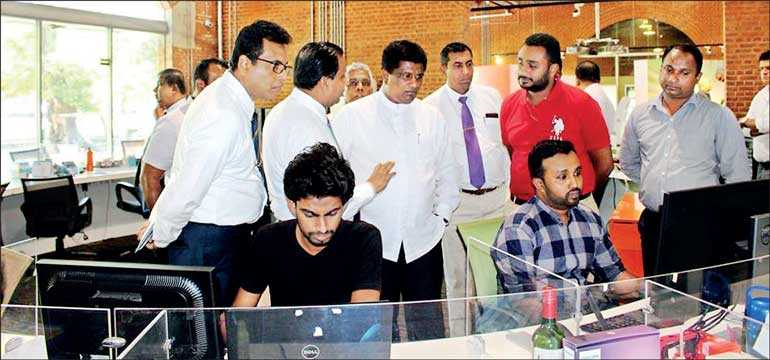Monday Feb 16, 2026
Monday Feb 16, 2026
Friday, 5 April 2019 00:00 - - {{hitsCtrl.values.hits}}

Information and Communication Technologies remained a State monopoly for a long time since first telegraph and then telecommunication systems were introduced in late 19th century. The Department of Posts and  Telecommunication was the sole authority that could provide phone connections. Radio Ceylon (commenced first as Colombo Radio in 1925) was the sole broadcaster for an equally long period.
Telecommunication was the sole authority that could provide phone connections. Radio Ceylon (commenced first as Colombo Radio in 1925) was the sole broadcaster for an equally long period.
The State was also the sole patron of data processing technology (The term ‘Information Technology’ was yet to be introduced) for several decades, starting from 1967, when the first mainframe computer was installed at State Engineering Corporation. If one were to travel back to ’70s one would find private players had very little to do with information and communication technologies.
Private sector enters
Then suddenly we saw a complete transformation. State monopoly began collapsing in all spheres above. Since the ’80s private sector embraced computers vigorously pushing state to backseat. Both manufacturing and service sectors in the early ’90s start seeing IT as a true change agent.
Production processes were automated. Hospitals, hotels and retailers, among others, started serving their customers better with increased use of IT. Sampath Bank, a new private commercial bank, became the local leader in transforming banking operations and taking the customer to a new height – in the process beating the two, then bigger, State banks.
The Department of Posts and Telecommunication was first segregated into two – keeping Post away - then created separate operation and regulatory arms. Operational arm ultimately became Sri Lanka Telecom Ltd. (SLTL), a public limited company. Regulatory arm ended as an independent regulator – Sri Lanka Telecom Regulatory Commission (SLTRC).
To cut a long story short, at some point private players entered into all three spheres, telecommunications, information technology, and broadcasting/telecasting. Largely, they are the ones who run the show today. (For this purpose, SLTL and Mobitel too could be more treated as private players given the nature of their business operations.)
This is not to say the State’s role is not crucial. It is, of course, but not as in the ’70s. Most stakeholders are outside the Government than in. the State plays only regulatory and guiding roles. To take an analogy, the State is more the brake and clutch, while the private sector is the accelerator.
This phenomenon is universal. Worldwide ICT sector is fuelled by the private players working in competitive market environments. Except in rare cases, the State always plays the role of catalyst and facilitator.
State sector dominates some other sectors
We cannot say the same about some other sectors. Take power and energy sector, for instance. Ceylon Electricity Board (CEB), a State sector player, maintains a full monopoly in electricity transmission and near monopolies in generation and distribution. (Lanka Electricity Company Ltd., LECO, which maintains the distribution network in certain areas, is again a State entity.)
Sri Lanka Railways maintains a monopoly over rail transportation – both passengers and goods. The National Water Supply and Drainage Board maintains a natural monopoly in water distribution. Private sector engagement is there in all these sectors, but it is the State that takes the front seat.
We must respect this difference in ICT sector as that was what made it unique and strong. ICT sector, humble origins of which goes back perhaps only to a few decades, has grown into a $ 1 billion industry, from a mere $ 166 million in 2006, with a workforce of over 85,000.
Being one of the key growth drivers within services exports, earnings from telecommunication, computer and information services have been demonstrating a steady growth over the last few years. With over 90% value addition and high paying jobs, it has made a significant impact on the growth of the Sri Lankan economy. This would have not been possible if it remained a State monopoly.
In this backdrop, does the State still have a role in ICTs? Yes, while private sector can bring new innovations and technologies to the market, the State can do the groundwork essential for them to operate. The State also should take the lead role in offering e-government solution, as the private sector has no mandate for it. These are in addition to its role as the policy leader.
Role of State in ICTs: Current projects as examples
Follow, some examples of ongoing projects at Ministry of Digital Infrastructure and Information Technology to illustrate the role of the State as a catalyst and facilitator in making ICTs truly work for people.
A common and frequent complaint of ICT industry is that they face a serious shortage of skilled ICT professionals. This needs to be immediately addressed. The Ministry aims for multiple projects to double the ICT student intake to state and private universities. The students will be offered easy payment loans. It has already been presented as a budget proposal by Minister of Finance. Also non-ICT graduates will be trained on ICT skills so they can commence their own ventures. For school students, school ICT labs program will be continued.
On the e-government front we have an ambitious plan to bring the entire government under one umbrella, virtually sharing data among themselves, by creating Sri Lanka’s ‘e-Population Registry’ – which we call the “mother of all databases”. That will have information of entire population at databases centrally built and administered for all government ministries and departments to share data. It will end the isolated information use by different government bodies. Once done, all government systems will be interoperable.
Yes, that is an unprecedented task. We will be implementing it. In addition at departmental level we have multiple programs too to digitally reform the processes, for example, may be in Department for Registration of Persons, Police or Department of Prisons.
We also work closely with the private sector to build the hard and soft ICT infrastructure essential for the business. For example, we research and implement right policies to develop the tourism industry. We take special attempts to back rebuilding of the north and east. IT parks at places like Kilinochchi are in the pipeline.
For the community, we implement programs for women – particularly women entrepreneurs. We have plans to assist online freelancers and digital marketers. We also plan to bring back Nenasala telecentres, a program that has been successful once, but failed because of too much political intervention.
The technologies develop so fast that we have to run faster on the treadmill. To meet the ever-growing demands, the Ministry of Digital Infrastructure and Information Technology is about to bring some new legislation. Already draft copies of the proposed Data Protection Act and Cyber Security Act are ready. In the coming weeks relevant stakeholders will provide their feedback. Once we all can agree, these bills will be passed in the Parliament.
So within three months, the country will have an advanced and updated cyber security framework for the industry to work with making Sri Lanka a preferred destination for IT enabled services hunting. These steps will certainly improve our ranking in ease of doing business.At national level we plan to introduce a long discussed but never materialised national payment platform. We work with industry specialist to get IoT and AI Roadmaps approved. Overall we are in the process of preparing a single Digital Information Technology Plan for the nation.
Most importantly, these happen without disturbing the crucial role of the private sector. We respect that. We not only recognise the importance of that role but prepare the stage for it as well. A catalyst and a facilitator. That is exactly we are and we do it our best.
(Ajith P. Perera is the Minister of Digital Infrastructure and Information Technology and Chanuka Wattegama is a business writer.)